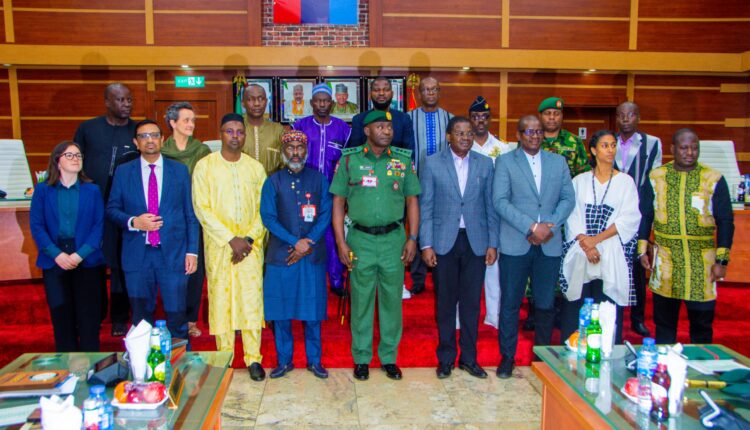With the Alliance of Sahel States (AES) – comprising Burkina Faso, Mali, and Niger –grappling with persistent jihadist threats and regional instability, a high-level nine-man delegation from the AES visited Nigeria in March to understudy its non-kinetic approaches to addressing violent extremism.
This visit is in recognition of a policy shift in Nigeria borne out of a growing acceptance that military operations alone are insufficient in the fight against terrorism and insurgency. Research has shown that only 7% of terrorist groups operating between 1968 and 2006 were militarily defeated. In the same period, more than 40% of terror groups ended their violence through negotiated settlements.
As Nigeria’s Chief of Defence Staff, General Christopher Musa, has repeatedly stated, military operations can only solve 30% of the country’s security challenges. He emphasises that non-kinetic efforts that are deeply rooted in good governance, equity, fairness, and justice will address the remaining 70%.
A promising new beginning?
During its five-day visit, the AES delegation examined Nigeria’s two key soft approaches against violent extremism – the national Demobilisation, Deradicalisation, and Reintegration (DDR) programme, popularly called Operation Safe Corridor, and the Borno state government-led Borno Model. These two initiatives have played critical roles in the deradicalisation, rehabilitation, and reintegration of former Boko Haram associates.
The AES visit underscored a growing realisation within the Sahel that a comprehensive security strategy must include socio-political and economic interventions alongside military responses. Against the backdrop of the damaging schism within ECOWAS which led to the emergence of AES as a breakaway, this renewed AES outreach to Nigeria holds transformative promises. It could help foster closer collaboration on tackling insecurity across the region and potentially open paths towards eventual reconciliation between ECOWAS and the AES.
Why the visit matters
The study tour was facilitated by the Norwegian Centre for Conflict Resolution (NOREF) and Inter-mediate, two organisations working on peacebuilding in some of the most complex conflicts around the world. On Nigeria’s part, the Coordinator of Operation Safe Corridor, General Yusuf Ali, and the Coordinator of the Fusion Centre for Peace and Dialogue, Honourable Aliyu Ibrahim Gebi, received and led the team during the tour. Nigeria also provided military escort and air support (surveillance and a standby fighter jet) for the eight-hour road trip from Maiduguri to Gombe, where the team spent time understudying Operation Safe Corridor.
The visit indicates a willingness by AES leaders to adopt more holistic counterinsurgency strategies that take the complementarity of soft and hard approaches into account. With all four countries (AES and Nigeria) facing similar challenges, Nigeria offers the most relevant case study in the region. Given their political differences, the delegation’s visit to Nigeria underscores the willingness of all four countries to seek operational collaboration on a common problem – violent extremism.
After this initial outreach, the stage now seems set for more expansive future collaboration between the countries. As the CDS stated, the security challenges currently faced by the four countries require cooperation and cross-border efforts because working together is the only way to defeat an enemy that straddles frontiers and impacts citizens across regional borders.
Nigeria’s non-kinetic models: lessons for AES
The visit offered AES the opportunity to learn from Nigeria’s experiences in implementing non-kinetic strategies. Unlike conventional DDR programmes, which are typically deployed in post-conflict settings where hostilities have ended, Nigeria was forced to design and implement its model amid an ongoing insurgency. This made its approach unique but also fraught with significant challenges.
Unlike countries that have implemented DDR after achieving relative peace, such as Liberia, Sierra Leone, and Rwanda, Nigeria had no established roadmap to follow and had limited opportunities to learn from other nations facing a similar situation. Instead, it had to develop its model through trial and adaptation, often making real-time adjustments to respond to security dynamics. This unconventional implementation led to key challenges, including public resistance to the reintegration of ex-combatants, tensions between justice and reconciliation moves, and difficulties in ensuring the long-term sustainability of rehabilitation efforts.
For the AES states, which continue to battle violent insurgency with a similar intensity to what Nigeria experienced between 2012 and 2014, Nigeria’s experience offers valuable lessons. By studying how Nigeria navigated these challenges, the AES countries have an opportunity to refine their own non-kinetic strategies, potentially avoiding some of the missteps Nigeria encountered while also drawing from its successes.
Looking ahead
Despite political challenges between AES and ECOWAS, Nigeria cannot afford to disengage from regional security cooperation, as instability in the Sahel directly affects its security through cross-border arms flows and extremist movements. To address these threats, Nigeria must institutionalise collaboration with AES through structured mechanisms such as joint security initiatives, intelligence-sharing frameworks, joint operations, and specialised training, including non-kinetic strategies. Additionally, Nigeria should establish a Sahel envoy and utilise official back channels to engage with AES. With its resources and expertise, Nigeria has the capacity to lead regional stabilisation efforts. A coordinated approach among these nations could serve as a model for African states to tackle shared security threats through pragmatic cooperation.
Malik Samuel is a Senior Researcher with Good Governance Africa in Nigeria where he contributes to security research and advocacy. He holds a Master’s degree in Conflict, Peace and Security from the Open University of Catalonia.

